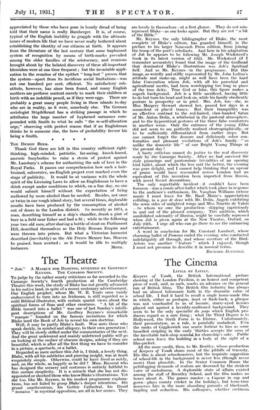The Theatre
A MASQUE FOR DANCING, INVENTED BY GEOFFREY
KEYNES. THE CAMARGO SOCIETY.
To judge by the rather scanty criticisms so far accorded to the Camargo Society's fourth production at the Cambridge Theatre this week, the study of Blake has not greatly advanced in his native land, in spite of a recent centenary advertisement. Our English prophet, whom Mr. W. B. Yeats once vainly endeavoured to turn into an Irishman, is still regarded as a mild Biblical illustrator, with certain quaint views about the spiritual forms of fleas and other creatures. "A bit of the Bible turned into a ballet" was one of last Sunday's intelli- gent descriptions of Mr. Geoffrey Keynes's remarkable " masque " founded on the famous inventions for which Blake used the Book of Job to reveal his own doctrine.
Well, it may be partly Blake's fault. Woe unto those who speak darkly, in symbol and allegory, to their own generation ! They will be slowly stifled under the commentaries of the next. And the great unleisured and mainly unlettered public will go on looking at the surface of obscure designs, asking if they are beautiful, which is after all the first thing we have to consider in a picture, a spectacle, or a ballet. Regarded as mere surface this Job is, I think, a lovely thing. Blake, with all his subtleties and piercing insight, was at heart exquisitely simple. Otherwise, could he have lived as nobly, and, on the whole, as happily as he did ? Mme. Raverat who has designed the scenery and costumes is entirely faithful to this surface simplicity. It is a miracle that she has not dis- appointed or shocked those who know Blake's illustrations. -Yet she too, like Mr. Keynes, in his modest programme explana- tions, has not failed to grasp Blake's deeper intentions. His grand anachronisms, his Gothic Cathedral, his Druid " remains" in mystical opposition, are all in her scenes. They are lovely in themselves—at a first glance. They do not mis- represent Blake—as one looks again. But they are not "a bit of the Bible."
Mr. Keynes, the only bibliographer of Blake, the most complete of Blake's editors, has guarded himself, in the preface to his larger Nonesuch Press edition, from joining the troop of the poet's scholiasts. And here in his adaptation of Job he appears to be following Mr. Joseph Wicksteed's book in its latest version of 1925. Mr. Wicksteed (if I remember accurately) found that the image of the Godhead that dominated Blake's illustrations was Job's Spiritual Self. And so Mr. Keynes—in the programme. But this image, as weirdly and stiffly represented by Mr. John Loftus's attitude and make-up, might as well have been the hard false Convention whom Job, with all his parochial and agricultural merits, had been worshipping too long in place of the true deity. True God or false, this figure makes a superb background. Job is a little sacrificed, having little to do but turn his head and look on, while his family obediently posture in prosperity or in grief. Mrs. Job, too—she, RS Miss Margery Stewart showed her, passed her days in a somnolent or placid trance. But their tranquillity was an effective contrast to the red-haired, claw-handed Satan of Mr. Anton Dolin, a whirlwind in the pastoral atmosphere, and to the hypocritical gestures of the three false comforters in another scene. Only the entrance of the young Elihit did not seem to me perfectly realized choreographically, or to be sufficiently differentiated from earlier steps. But one cannot forget the demure and deliciously sober con- formities and pleasant evolutions of Job's family—" so unlike the domestic life" of our Bright Young Things at the present day !
A hasty criticism cannot do justice to the real discovery made by the Camargo Society. After we had survived the stale prancings and pantomimic trivialities of an opening bird ballet, about which the less said the better, the evening was pure delight, and I cannot help thinking that an uproar of praise would have resounded across London had an equivalent of this invention been imported from Russia, with novel Soviet decorations.
The only regrettable incident—it couldn't have been foreseen—was a comic after-ballet which took place in response to the audience's enthusiasm, Dr. Vaughan Williams (whose music I must leave for Mr. Basil Maine's appreciation) colliding, in a pas de dews with Mr. Dolin, Angels exhibiting the sewn sides of unlighted wings and Miss Ninette de Valois —to whom we owe the production—skipping capriciously in and out of the pleased company. This addition, which annihilated solemnity of illusion, might be carefully repressed when Job is given again at the New Theatre, Oxford, on July 24th. I urge all who can go there to see the entrancing entertainment.
A word in conclusion for Mr. Constant Lambert, whose charming ballet of Pomona ended the evening, who conducted indefatigably all through, and whose overture of the Bird- Actors was another "feature " which I enjoyed, though I must not presume to describe it in musical terms.
RICHARD JENNINGS.


































 Previous page
Previous page